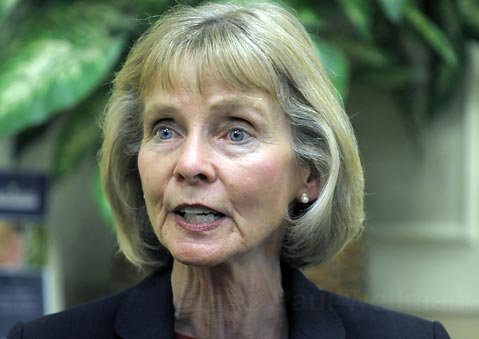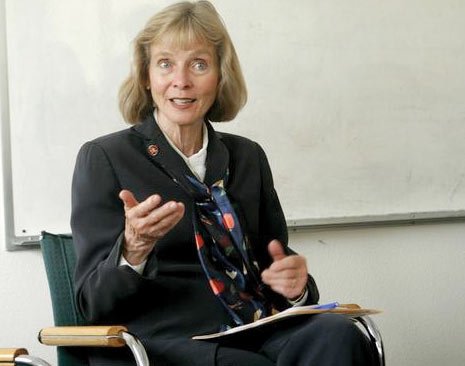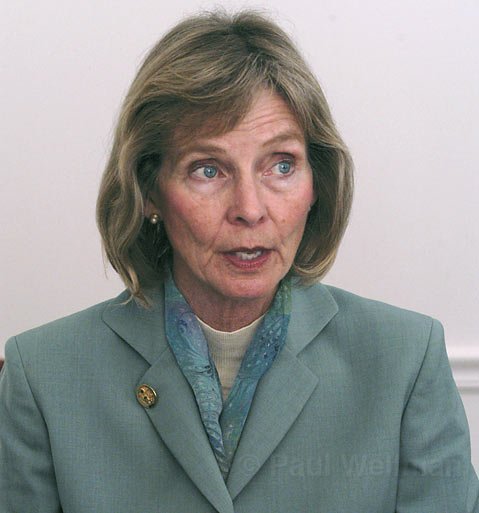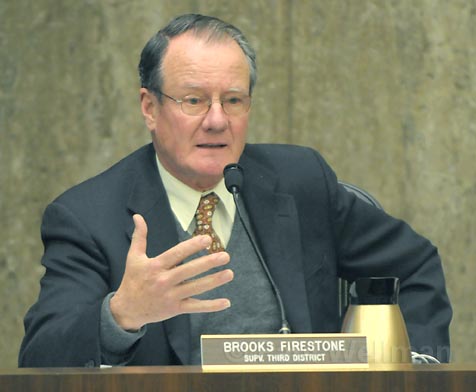“Terrible Decision”
Capps Blasts Supreme Court Ruling Lifting Restriction on Corporate Campaign Donations; Ruminates on GOP Victory in Massachusetts

Lois Capps, it turns out, drives a 20-year-old Lincoln Continental. Normally, that fact would be of sublime irrelevance. But Capps, a liberal Democrat who’s represented Santa Barbara in Congress since 1997, will be up for reelection later this year. And given the sudden political mood swings now seizing the nation, a candidate’s choice of wheels might have significant bearing on whether she (or he) makes it to the finish line. Already, Jennifer Stockdale, the wife Dave Stockdale — one of the two Republicans vying to run against Capps — is touting the fact that her family has long made do, proudly and happily, with a 1990 bubble-topped Ford van. Little wonder. Massachusetts Republican Scott Brown shocked the world by beating his Democratic rival in the bluest of the Blue States. He campaigned behind the wheel of his now famous pickup truck as the classic Everyman, intent on representing Main Street rather than Wall Street.
Capps said she was upset Brown won the Senate seat left vacant with the death of Teddy Kennedy because it will make the job of passing some form of health care reform that much harder. Capps is a staunch supporter of health insurance reform, and Brown vigorously campaigned against the two health reform measures now under consideration. But Capps said it would be a mistake to regard Brown’s victory as a referendum on Barack Obama’s presidency or on health care reform. “What it tells me,” Capps said of Brown’s victory, “is that as a member of Congress, you can’t take anything for granted. It’s important to be reminded of the frustration felt across the country. People are so frustrated. That leads to anger. And that’s expressed at the polls.”

Capps is not as inclined to blame Brown’s Democratic rival, Martha Coakley, as many have been. Nor is she quick to conclude that the Democratic sky has crashed and burned, as many critics — from both the left and the right — have concluded. Instead, Capps suggested that a Republican victory in Massachusetts, for all its vaunted liberalism, was not all that freakish. Massachusetts voters have elected several Republican governors in recent years (Mitt Romney being the most obvious) and only one woman to Congress. Elsewhere around the country, Capps noted that Democratic candidates won in three special congressional elections in the past year, one in California — John Garamendi — and two in New York. In one of the New York races, a Democrat won in a district that had been controlled by Republicans since the Civil War.
Capps said she does not expect new Senator Brown to pull a 180 on health care reform, saying, “He’s staked out his position as the 41st vote and that’s not going to change.” Translated, that means Brown gives the Republicans 41 members in the Senate, the bare minimum needed to wage a filibuster against any eventual health care package. Capps noted with some irony that Massachusetts had enacted a universal health care bill several years ago that contained many of the same provisions that Congress is now considering. “That bill was very unpopular in Massachusetts when it was under consideration,” she said. “But now that it’s passed, it’s extremely popular. Ninety six percent of residents there have insurance. That tells me we should stay the course.”
Capps dismissed the notion that health care reform is dead with Brown’s election. “I don’t agree with that at all,” she said. She said there was little of actual controversy in the bulk of either of the two health care reform bills now under consideration, one passed by the House, the other by the Senate. Capps said she’s mindful that recent polls indicate public support for health care reform is waning. She remains convinced, however, that health care reform is essential. “The status quo is just not sustainable,” she insisted. “Too many people can’t afford insurance, too many people are being cut off from the insurance they do have.” She acknowledged that critics of health insurance reform have had impact. “When people see how the sausage is being made, it isn’t pretty. It gives the minority an opportunity to focus on problems.”

Capps noted that Brown was elected just as President Obama hit the one year anniversary of his inauguration. She blamed much of the gathering impatience with Obama on the tough challenges the new administration had to confront. When Obama took office, Capps said, 600,000 people a month were losing their job. The economy was threatening to jump off a cliff; Lehman Brothers and other major brokerage houses were collapsing and the international financial market looked poised to dive head first down the drain. Obama, she said, was forced to take measures to stabilize the financial markets that proved unpopular and unpalatable across the political spectrum. In the rhetorical face-off between Wall Street and Main Street, the Obama Administration found itself unfairly tagged, Capps said, as soft on corporate excess.
The initial legislation to bailout Wall Street, she insisted, was passed by the Bush Administration “with no strings attached.” Now, she said, Congress and Obama are revisiting some of those issues, to ensure large banks can’t engage in the same reckless lending practices responsible for the crisis, or that executives of banks receiving federal bailout money don’t get large bonuses. Capps said she supports the bill just proposed to tax bank executives for such bonus payments. The stock market dropped two percent the day Obama unveiled the legislative package he claimed would keep the banking industry more prudent and accountable. “So be it,” Capps said. “It’s offensive to see huge bonuses being given out while people are still losing their job.”
Capps said many of the larger banks are repaying their bailout loans faster than expected. She’s supporting legislation that would make those funds available to smaller banks — through the Small Business Administration — on the condition that they made loans available to small companies. After a series of meetings with business groups last week, Capps said she heard frequent complaints that credit was simply not available for small businesses.

Capps found nothing good to say about the Supreme Court’s 5-4 ruling that nixed 100 years worth of federal restrictions on corporate campaign contributions. “This is a terrible decision,” Capps said. “This takes us back so far in terms of accountability and the electoral process.” The Supreme Court found that prohibitions and restrictions on campaign donations by corporations and by unions violate free speech provisions of the constitution. Capps warned that the wave of campaign cash the court ruling will unleash “will drown out the voice of Americans, the voice of individuals.” Democrats tend to receive less in corporate donations that Republicans, but Capps said her reaction has nothing to do with partisan affiliation, but on the electoral process. “The effects on democracy is utterly damaging,” she said.
Capps acknowledged that corporations and unions are currently unfettered in their ability to donate to independent expenditure committees, which in turn, run “pseudo-issue” ads blistering one candidate or the next. “The way it has been is like a spigot that’s leaking some,” Capps said. “Now it will be like you turned it on full force.” Independent expenditure committees, under existing election law, have to report who made donations and for how much. Corporations or unions seeking to funnel cash into campaigns via such committees have to form political action committees first. They, in turn, have to file campaign disclosure statements. Under the new rules of engagement, corporations and unions will be able to spend directly on candidates’ campaigns from their operating revenues.
Capps said she’s always taken her opponents seriously, even though she hasn’t faced a serious challenge since 2002. Since taking office in 1997, Capps has emerged as the focal point for a Democratic Party machine that hitherto had not existed in Santa Barbara County. The district boundaries were redrawn in 2000, giving registered Democrats a strong numerical advantage and making her reelection all but preordained. For Republican candidates, Capps was the political buzz saw into which they willingly sacrificed themselves for the good of the party. This year — with the Republican Party attempting to regain some of the Congressional seats they lost in the past four years — the GOP cannot afford to give Capps a free pass. If nothing else, the Republicans need to field a candidate capable of distracting Capps’s considerable campaign war chest so she can’t simply donate to vulnerable Democratic candidates elsewhere.

Last week, former county supervisor Brooks Firestone, a moderate Republican from Santa Ynez, announced that he was giving serious thought to running against Capps. But Firestone — who does not live in the congressional district — quickly decided against such a venture. A financial advisor from Thousand Oaks, John Davidson, announced that he’ll seek the Republican nomination. So too has Dave Stockdale, who owns a small insurance company in Santa Maria. Neither Davidson nor Stockdale has run for elective office before, let alone served in any public capacity. Both have stressed their hard-scrabble upbringing and fiscal restraint.



